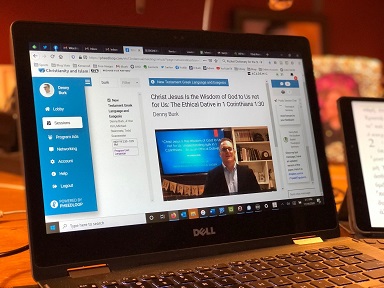 I could not have predicted the Revoice conference would become the catalyst for controversy that it has now indeed become. Debate about the celibate gay identity movement has been going on for years. Both in print and online, the controversy was joined years ago about sin, temptation, desire, concupiscence, etc. And yet, it has been a controversy largely ignored by many evangelicals.
I could not have predicted the Revoice conference would become the catalyst for controversy that it has now indeed become. Debate about the celibate gay identity movement has been going on for years. Both in print and online, the controversy was joined years ago about sin, temptation, desire, concupiscence, etc. And yet, it has been a controversy largely ignored by many evangelicals.
That’s why I couldn’t have predicted that a conference featuring speakers whose views have been widely known for years would somehow change evangelical indifference about problems within the celibate gay identity movement. Even last Fall when celibate gay identity proponents were some of the most strident critics of The Nashville Statement, evangelicals didn’t seem to notice. In fact, Christianity Today had an editorial objecting to The Nashville Statement almost entirely on the grounds that it excludes the likes of those who are now involved in Revoice.
Nevertheless, somehow, the Revoice conference has gotten everyone’s attention (finally!). And this is a good thing. Evangelicals have been long overdue in considering these questions carefully in the light of scripture.
The conference was held last weekend at a PCA church in St. Louis. I did not attend the conference, but I did get a chance to read transcripts and watch videos from the three plenary sessions of the conference. Here are some brief reflections on what I saw and read:
1. I should say, first of all, that I was moved by the fact that so many of the presenters seemed to have experienced a great deal of pain in their lives. I noticed on social media that some attendees were expressing thankfulness just to be around other people who have been through the same struggles they have been through. There were many expressions of sadness from the podium about churches that have not treated them well. This made me grieve. It underlined one of the big reasons why this controversy is so difficult. This stuff is really personal, and churches really have dropped the ball in many ways. Even though I have strong disagreements with the celibate gay identity movement, I grieve their suffering on this point and want to do my part in my own church to make sure that past errors aren’t repeated. I also wish to reiterate, in spite of our disagreements, I really do celebrate their expressed commitment to celibacy outside of marriage. Wesley Hill was particularly strong on this point in his address.
2. In my first post about Revoice back in May, I suspected that the conference would add very little to the conversation about celibate gay Christianity. I think that prediction largely turned out to be realized. You can check out the plenary addresses at the Revoice YouTube Channel, and judge for yourself. For my part, I don’t think anything new has been added to our knowledge about the celibate gay identity movement that we didn’t already know. In short, the conference was of a piece with what has come before in books and articles and other conferences. Perhaps the only new wrinkle is the involvement of a PCA church and the questions that raises for that denomination.
3. I have been and continue to be struck by the ecumenism of the Spiritual Friendship project. The alliance with Roman Catholics, in my view, accounts for no small part of the theological confusion of the movement. It is one thing to join with Roman Catholics as co-belligerents in defense of religious liberty or the sanctity of life. It is another thing altogether to forget that Protestants have deep-seated, long-standing differences with Roman Catholics about original sin, concupiscence, temptation, baptism, justification, sanctification, and a host of other issues. These differences are fundamental, and they affect how one appraises homosexuality and transgenderism. And yet, those differences seem glossed over among those in both the Spiritual Friendship and Revoice projects. Even if we were to set aside our differences about so-called “gay Christianity,” a female Roman Catholic delivering a message from the pulpit of a PCA church ought to draw some attention all on its own. Is the Reformation over? You might think so if you were looking at the dais of Memorial Presbyterian Church in St. Louis last weekend.
4. At least two plenary session speakers warned against the “idolatry” of the nuclear family. For example,
NATE COLLINS: “Is it possible that gender and sexual minorities who have lived lives of costly obedience are themselves a prophetic call to the church to abandon idolatrous attitudes toward the nuclear family toward sexual pleasure? If so, then we are prophets.”
I agree with Albert Mohler; the human heart can make an idol out of anything, including family. Nevertheless, the refrain warning against family-idolatry is troubling. It is not idolatry to honor and to esteem conjugal marriage and the children that such marriages produce. Indeed, the Bible commands us, “Let marriage be held in honor among all” (Heb. 13:4). Honoring conjugal marriage as the normative ideal is not idolatry. I am not sure this was clear in the warnings I heard from the podium at Revoice.
5. In his plenary address, Nate Collins denounces critics of celibate gay identity in sharp terms. Collins says,
Matthew 23, I’m just going to read one of the famous woes. “Then Jesus said to the crowds and to his disciples, ‘The scribes and the Pharisees sit on Moses’ seat, so do and observe whatever they tell you, but not the works they do for they preach but do not practice. They tie up heavy burdens’.”
There are some thoughts and opinions about our experience of orientation that are heavy burdens. Right? Bad shepherds give us those burdens. They are hard to bear and lay them on people’s shoulders, but they themselves are not willing to move them with their finger. This is the first of seven woes that Jesus pronounces over the Pharisees, the bad shepherds. And the common thread through all of them is that they’re being unjust.
So Collins identifies his critics as “bad shepherds” who unjustly “tie up heavy burdens” on celibate gay Christians. These critics are the kinds of people that Jesus pronounces “woe” over. Notice that Collins doesn’t engage the critiques. He simply calls down judgment on the critics. I don’t think this is a productive way to engage the critics. A better way would be to show from scripture that their critiques are unwarranted, but Collins does not do that. Collins elaborates:
Is it possible that gay people today are being sent by God like Jeremiah to find God’s words for the church to eat them and make them our own? To shed light on contemporary false teachings and even idolatries, not just the false teaching of the progressive sexual ethic, but other more subtle forms of false teaching? Is it possible that gender and sexual minorities who have lived lives of costly obedience are themselves a prophetic call to the church to abandon idolatrous attitudes toward the nuclear family toward sexual pleasure? If so, then we are prophets.
Collins casts celibate gay Christians as the saviors of an idolatrous church. I think this demonstrates just how difficult this conversation has become. After all, who dares gainsay the “prophets”?
6. Spiritual Friendship hosted a pre-conference featuring Matt Anderson, Ron Belgau, Johanna Finegan, Joe Trout, and a panel discussion. (Matt Anderson has helpfully posted his entire manuscript at Mere Orthodoxy.) I still have many differences with the speakers here, and I have been back and forth publicly with Belgau in particular about sin, desire, and temptation. You can read my piece of it here if you are interested. I won’t rehearse that argument again in this post.
In spite of all our differences, I did find one point of contact with Belgau and Finegan’s talks. They have strong critiques of reparative therapy, and I actually share many of their concerns on this front. In any case, it is clear that their disappointment with this “ex-gay” approach has shaped their own approach to the issues. Belgau and Finegan do not want to hold out false promises to struggling Christians, and they feel that is what happened with now defunct “ex-gay” ministries. In large part, they feel they are dealing with the aftermath of the failure of those ministries. Those of us who are critics of Revoice would do well to understand this history and how it is still shaping the conversation. In this light, it is not hard to see how the Spiritual Friendship project has been shaped by refugees from the “ex-gay” movement. (If you want to understand my skepticism about reparative therapy, you need to know that I have been influenced by Heath Lambert on this and agree with him. Read his take here). [UPDATE: Also, I would be remiss if I failed to point out that Finegan gave a strong complementarian shout-out.]
Now that the conference is over, we are still left with the theological difficulties that we all knew about before the conference. Those differences are important and must be adjudicated. I don’t think Revoice moved the ball down the field on that front, and I didn’t expect it to.
My hope and prayer have always been that evangelical Christians might come together to reaffirm what the Bible has always taught about sin, temptation, and desire. Despite some negative signals from Revoice, that is still my hope and prayer. Until then, the debate goes on. It must go on. We need a faithful accounting of the Bible’s teaching about sexuality and gender, and Revoice has not given it to us.





